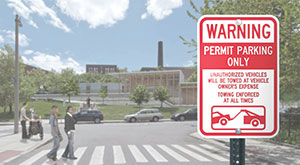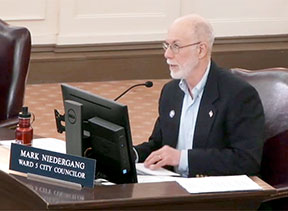
New restrictions aimed at reducing parking problems posed by new residents occupying new developments have been proposed by the Somerville Traffic Commission.
By Jim Clark
The City of Somerville Traffic Commission approved a proposal to restrict the issuance of parking permits to future residents of new development located within walking distance to a rapid transit station of the MBTA’s Red, Orange, or Green Line services at its latest meeting on Thursday, December 12.
According to the Commission, the purpose of this policy is to preclude future residents of new development from creating additional traffic and parking problems, such as traffic congestion and on-street parking shortages, while helping to reduce air pollution and improve both pedestrian safety and emergency service response time.
Additionally, the policy is intended to help implement multiple objectives of the city’s Comprehensive Plan, SomerVision.
The new policy only applies to the future residents of new development located within walking distance to a rapid transit station as identified on the proposed map. Walking distance is considered to be a ten-minute walk and the area of a city within that distance is referred to as a “Transit Area.”

Ward 5 Councilor Mark Niedergang updated the City Council on the proposed parking restrictions at its most recent meeting.
All properties located in the Neighborhood Residence district are excluded from the proposed restriction and all properties outside of walking distance to a rapid transit station are excluded. The Neighborhood Residence district in the proposed new zoning ordinance includes almost all of the single, 2-, and 3-family properties in Somerville, which will still be able to receive resident parking permits.
Existing resident parking permits remain valid and residents of all existing residential addresses, whether they already have a resident parking permit or not, remain eligible for on-street parking permits in the future.
New development includes the construction of entirely new buildings and the gut rehabilitation of existing structures that add new dwelling units in Transit Areas.
The Inspectional Services Department (ISD) will provide a list of addresses to the Parking Department as Certificates of Occupancy are issued for new development.
Restricted units will not receive guest permits as the new policy proposes to restrict access to all permits, including guest permits.
The new policy exempts future residents that may be “choice limited,” including persons with disabilities, occupants of affordable dwelling units, and residents with extenuating circumstances.
The proposed policy does not apply to residents of existing housing in Somerville. Like all real estate decisions, households that do not yet live in Somerville will have to make a choice about whether to purchase or rent a home or apartment that is subject to this restriction based on their own personal needs.
The Parking Department will maintain a list of addresses subject to the restriction.
The new zoning ordinance requires developers to market new housing in a Transit Areas as ineligible for residential parking permits and to inform potential new residents of the restriction through mandated zoning permit conditions.
Because the proposed policy does not apply to residents of existing housing in Somerville, local businesses should expect no loss of customer base from what they have today due to the restriction and are likely to gain many additional customers that walk, bike, or take transit to their locations as a result of new development.
The new policy will become effective on January 15, 2020.
Ward 5 City Councilor and Traffic Commission Chair Mark Niedergang reported on the proposed policy at the regular meeting of the Somerville City Council on the same day as the Traffic Commission saying, “I am extremely pleased to report that the Traffic Commission voted tonight to adopt the policy that Mr. Bartman drew up, with comments from the Traffic and Parking Committee, to restrict residential parking permits for new developments and transit-oriented districts.”
“It was a unanimous vote,” Niedergang continued. “Councilor McLaughlin attended and made some excellent remarks about why this is important and about the broad public support that we have experienced for this at Zoning Board meetings, community meetings, public hearings around the zoning overhaul. So I’m really pleased about this.”
Niedergang commended Dan Barton from the Planning Department and Andy Connor from the Mayor’s Office for their work and for bringing many other departments into the process.
Regarding the policy, Niedergang emphasized, “It will only restrict newcomers to the city, people who are living in newly constructed housing units in large buildings.”
FAQs and further information on the proposed parking policy can be found on the city’s website at https://www.somervillema.gov/departments/traffic-commission.















Can someone tell me when these anonymous fiefdoms (commissions) gained law-making power?
Do these clowns think Somerville is the only place that has the T and is popular? I don’t see anyone paying $3,000/month to live in a place where they are basically told they cannot own a car because they cannot legally park on city streets. Do they think taxpaying property owners won’t object to paying the same in taxes without use of the public ways? But not to worry, if you’re disabled you can have an audience with the King and beg for the privilege of using a vehicle. This has the potential of lots of lawsuits against the city.
Hey, #thekinghasspoken, don’t you know that we’re a bike-friendly and pedestrian-friendly city? We’re not supposed to have cars here, because nobody uses them.
Absolutely ridiculous! People are not giving up their cars! And no guest parking permits? Seriously????? People have family who want to visit and do not ride bikes or walk 100 + miles! Just asinine!
Unless “extenuating circumstances” include impractical / impossible to get to work by subway, has kids, and anticipate visitors, among other things the only impact this will have is to cause new developments to become flop houses for a very narrow demographic slice of somerville.
Seems like a really great proposal. I hope this goes through. It will certainly serve us all very well.
Another plan not thought out. What ever happened to using common sense and looking into all the effects this will have? Absolutely no vision here.
This is ridiculous. And I say that as somebody who will be exempt.
The city council and various commissions need to stop acting like cars are unnecessary or undesirable. You need a car to get around. The T can mitigate that to some extent, but it is not always feasible or preferable. And who the hell is going to buy new $900k units if they can’t even get a city sticker?
Aside: sounds like another instance where the city will screw over the numerous residential 6-unit houses (3 on each side)? They aren’t exempt?
And how is it that affordable unit welfare recipients do get passes?!?! That makes zero sense.
I’m not surprised in the least Niedergang’s photo is on the article. Dude makes Bernie Sanders look like Mussolini. Never heard an idea that he likes that I also like.
Yet another classic example of government run amuck.
This appears to be a policy that discriminates against older residents and those who have physical limitations. We need transparency on how a ten-minute walking distance is determined. Is it based upon a healthy 18-year-old? Is consideration given to older citizens or citizens with disabilities?
No one is forced to buy a or rent these future units. It doesn’t impact any current property. People with mobility issues are exempt. It doesn’t make it harder to park. It doesn’t increase traffic as much as a free parking building would.
Really guys grow up.
Interesting to see how this plays out, as it in effect disallows on-street parking for residents / guests of any new development (most of the city being within 10 minute walk of a current future subway station), I expect this gets reversed within 10 years. Developers will find there is in fact a limit to the number of people who have the privilege of a career / lifestyle that allows one to live car free. Alternately they all build expensive units with expensive parking garages. Neither option is conducive to families / long term residents.